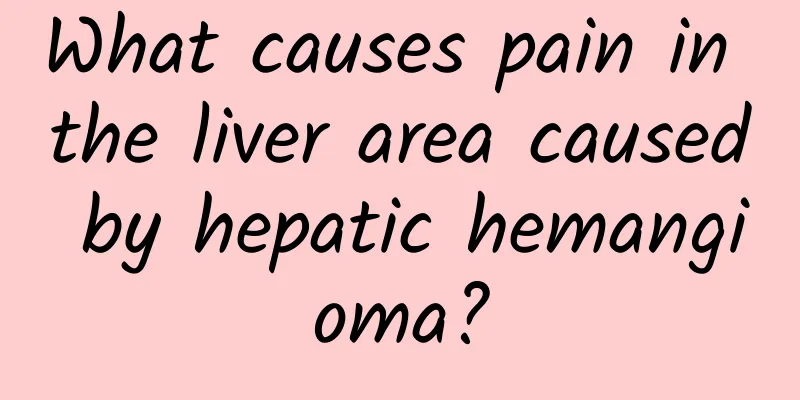What causes pain in the liver area caused by hepatic hemangioma?

|
Pain in the liver area is a common symptom of hepatic hemangioma. Patients may also experience abdominal masses and gastrointestinal symptoms, such as loss of appetite, nausea, vomiting, belching, etc., so attention should be paid to these symptoms. 1. Abdominal mass The abdominal mass has a cystic feeling, is non-tender, and has a smooth or rough surface. Conductive vascular murmurs may occasionally be heard when auscultating the mass site. 2. Gastrointestinal symptoms Indigestion symptoms such as dull pain and/or discomfort in the right upper abdomen, loss of appetite, nausea, vomiting, belching, and fullness after eating. 3. Compression symptoms Giant hemangiomas can push and compress surrounding tissues and organs. Compression of the lower esophagus may cause dysphagia; compression of the extrahepatic bile duct may cause obstructive jaundice and gallbladder effusion; compression of the portal venous system may cause splenomegaly and ascites; compression of the lungs may cause dyspnea and atelectasis; compression of the stomach and duodenum may cause gastrointestinal symptoms. 4. Rupture and bleeding of hepatic hemangioma Rupture and bleeding of hepatic hemangioma may cause severe upper abdominal pain, as well as symptoms of bleeding and shock. Most of them are large hepatic hemangiomas growing below the costal arch that rupture and bleed due to external force. 5. Kasabach-Merritt syndrome Coagulation abnormalities caused by thrombocytopenia and consumption of large amounts of coagulation factors. The pathogenesis is blood retention in giant hemangiomas, which consumes a large amount of red blood cells, platelets, coagulation factors II, V, VI and fibrinogen, causing abnormal coagulation mechanism, which can further develop into DIC. 6. Others When a pedunculated hemangioma growing free outside the liver twists, necrosis may occur, causing severe abdominal pain, fever, and collapse. In some patients, huge hemangiomas are accompanied by the formation of arteriovenous fistulas, which increase the amount of blood returning to the heart and lead to heart failure. |
>>: Is hepatic angiosarcoma contagious?
Recommend
Diet for liver cysts
Liver cyst is a common chronic liver disease. It ...
What should I do if my baby's head is tilted when sleeping for more than one month?
When a newborn baby just comes out of the mother&...
What are the symptoms of diarrhea and dehydration?
In fact, in life, if we eat something unclean, we...
Side effects of Chinese medicine skin peeling
As we age, our skin elasticity will generally bec...
What are the emergency solutions for vaginal itching during menstruation?
If women experience vulvar itching during menstru...
What to do if your 3-month-old baby has eczema on his face
When the baby is three months old, parents will w...
What to do if your hair turns grey at 40
After people reach the age of 40, the melanin pro...
Can I eat brown sugar when I have a cold? What should I do?
Brown sugar must be familiar to female friends, b...
What to do if internal hemorrhoids become inflamed? Here are some dietary treatments
In modern life, many people have hemorrhoid probl...
How to treat lumbar disc herniation
Lumbar disc herniation is not unfamiliar to many ...
How to treat dark menstrual blood
There are many reasons why women have dark menstr...
Pain between the coccyx and anus
If there is swelling and pain between the coccyx ...
How long does it take to get a denture after a tooth extraction?
Generally, teeth with serious lesions that cause ...
How to effectively regulate poor blood circulation
If the blood circulation is not good, it will als...
There is a gap between the teeth
We all know that smiling without showing teeth is...









